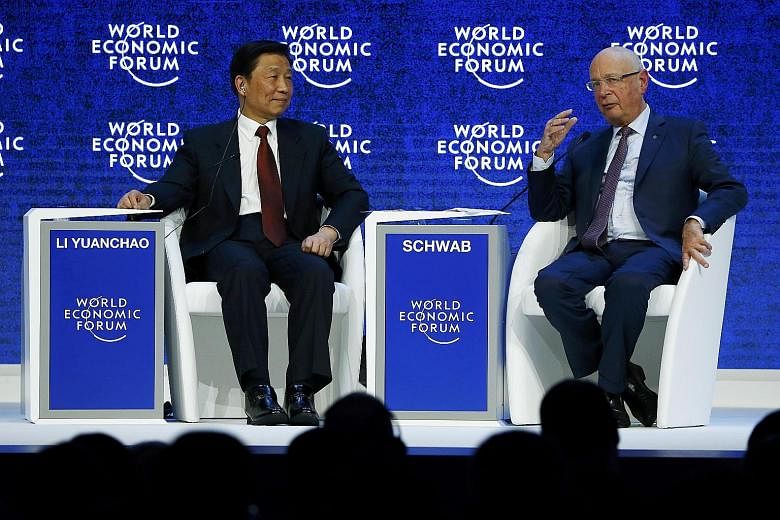DAVOS • China is willing to keep intervening in the stock market to make sure a few speculators do not benefit at the expense of regular investors, Vice-President Li Yuanchao said in an interview.
And China has no plan to devalue the yuan, he added.
Calling the country's market "not yet mature", Mr Li said the government would boost regulation in an effort to limit volatility.
"An excessively fluctuating market is a market of speculation where only the few will gain the most benefit when most people suffer," he told Bloomberg News on Thursday after arriving at the World Economic Forum's annual meeting.
"The Chinese government is going to look after the interests of... most of the investors," he said.
Mr Li, 65, is the most senior Chinese official yet to underline the government's readiness to intervene should the market turmoil of last summer and the start of this year continue.
So far this year, the Shanghai Composite and Hang Seng indexes have lost more than 15 per cent, even as the central bank injects cash into the system to drive down borrowing costs and boost the economy.
Mr Li led a delegation to Davos looking to offer reassurances about the health of an economy that grew 6.9 per cent last year, its slowest pace since 1990.
Speaking in an interview with Bloomberg Television from the World Economic Forum, billionaire investor George Soros said a hard landing for China's economy is "practically unavoidable".
Investors have raised questions about the government's credibility after a series of reversals, including a decision to abandon a stock circuit-breaker system after plunging prices twice halted trading for the day earlier this month.
"On the one hand, we need to make the stock market more dynamic but, on the other hand, we also need to strengthen regulation of the stock market, and we resolve to do that," Mr Li said in the interview, also attended by officials including the deputy chairman of the National Development and Reform Commission.
China's benchmark Shanghai Composite Index rose 1.3 per cent to 2,916.56 at yesterday's close. The gauge has tumbled 19 per cent this year, the most among the 93 global benchmark measures tracked by Bloomberg.
Mr Li's comments are aimed at the vast majority of investors in China's stock markets. Individuals drive more than 80 per cent of trading on bourses in Shanghai and Shenzhen, versus about 15 per cent in the United States.
He was echoed by Mr Fang Xinghai, vice-chairman of the China Securities Regulatory Commission, who also attended the interview. Mr Fang said the government intervened last year not to boost stocks as people thought, but to pump liquidity into the market after fund managers sold shares.
The government is prepared to intervene again "if the liquidity problems are quite severe and major and could lead to systemic risks", he added.
China, which for so long provided comfort to investors, has become one of their greatest sources of anxiety. It has shaken confidence with surprise currency moves, confused with chaotic market regulation, and struck fear with criminal probes of financial executives.
To criticism that policymakers have not been clear on their intentions with the yuan exchange rate, Mr Li said: "The fluctuations in the currency market are a result of market forces, and the Chinese government has no intention and no policy to devalue its currency."
He redirected concerns about exchange-rate volatility to actions by the US Federal Reserve, saying "fluctuations in the currency market started with the raising of interest rates by the Fed" last month.
Mr Li also sought to convince the 2,500 business and political leaders in Davos that China would stick to its pledge to open its financial markets, and that the world's second- biggest economy remains strong.
"The contribution of China's economic growth to world economic growth remains unchanged," he said. BLOOMBERG

